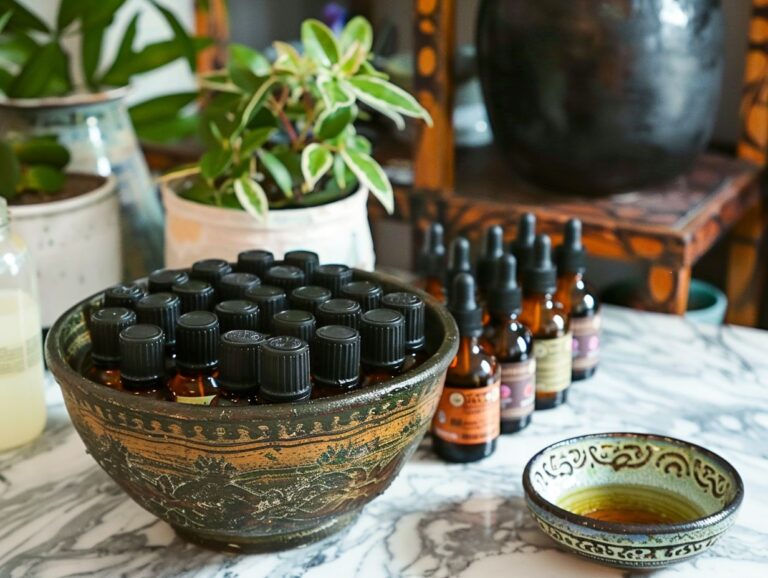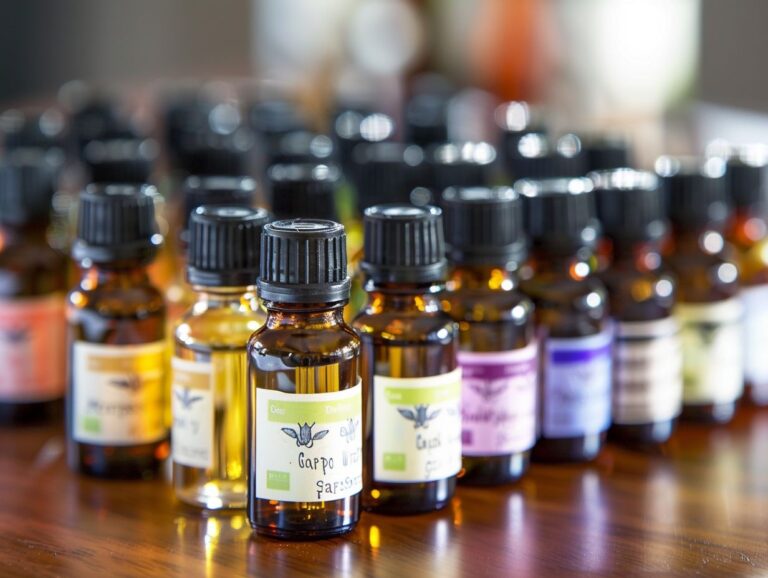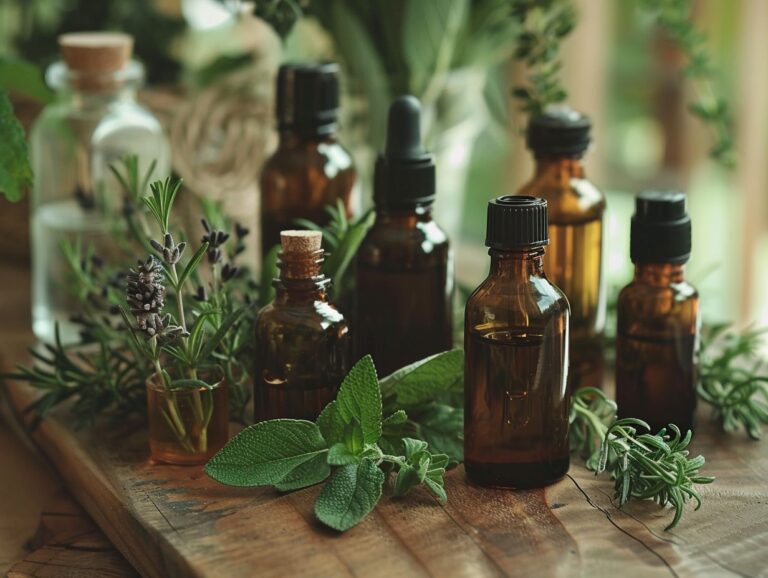Where to Apply Essential Oils for Immune System
Essential oils have gained popularity for their various health benefits, including their ability to support the immune system.
We will explore what essential oils are, how they can affect the immune system, and which ones are best for boosting immunity.
We will also discuss the different ways to apply essential oils for maximum benefits, as well as precautions to keep in mind.
If you’re looking to incorporate essential oils into your daily routine for immune system support, keep reading to learn more.
Key Takeaways:
What Are Essential Oils?
Essential oils are concentrated extracts derived from various plants, known for their potent aromatic compounds. They have been used for centuries in herbal medicine and aromatherapy due to their therapeutic properties and unique scents.
The origins of essential oils can be traced back to ancient civilizations such as Egypt, where they were highly prized for their medicinal and spiritual benefits. These oils are typically extracted through methods like steam distillation or cold pressing, preserving the natural essence of the plants. Commonly used essential oils include lavender, peppermint, and tea tree oil, each with its unique therapeutic qualities. From promoting relaxation to relieving congestion, these oils have a wide range of applications for health and well-being.
How Do Essential Oils Affect the Immune System?
Essential oils can modulate the immune system by influencing immune response pathways, reducing inflammatory cytokines, and supporting overall immune function. Their impact on innate and adaptive immune responses makes them valuable for immune support.
Regarding the immune system, essential oils work through a variety of mechanisms. For instance, certain essential oils can directly interact with immune cells, helping to regulate their activity and promote a more balanced response. The anti-inflammatory properties of some essential oils can help to reduce excessive inflammation, which is a common issue in immune dysregulation. By enhancing the production of white blood cells and strengthening the body’s defense mechanisms, essential oils play a key role in bolstering the immune system’s resilience and efficiency.
What Are the Best Essential Oils for Boosting the Immune System?
Regarding boosting the immune system, some of the top essential oils include clove, lavender, and tea tree oil, known for their immune-boosting properties and compatibility in blends for enhanced efficacy.
Adding to the list of effective essential oils for immune support, Eucalyptus oil stands out for its ability to clear congestion and support respiratory health. Peppermint oil is another powerhouse known for its cooling sensation and digestive support, making it a versatile addition to immune-boosting blends.
Lemon oil not only uplifts the mood but also contains cleansing properties that can aid in purifying the air and surfaces during cold and flu seasons. Additionally, Frankincense oil offers both immune support and calming effects that promote overall well-being.
Peppermint Oil
Peppermint oil is renowned for its refreshing aroma and its ability to support the respiratory system. When diffused, it can help clear the airways and promote easier breathing.
Plus its aromatic benefits, peppermint oil is often used topically to alleviate respiratory issues. When diluted and applied to the chest, throat, or back, it can provide a cooling sensation and help relieve congestion. This versatile oil can be blended with Eucalyptus or Tea Tree oil to enhance its respiratory benefits even further. The combination of these oils creates a powerful synergy to support overall respiratory health.
Eucalyptus Oil
Eucalyptus oil is a popular choice for immune support and respiratory health. Its invigorating scent and properties make it beneficial for the immune system and promoting clear breathing.
Known for its antiviral and antimicrobial properties, eucalyptus oil can help protect the body against various pathogens, supporting a healthy immune response. When inhaled, its refreshing aroma can clear congestion and ease breathing difficulties. One effective way to maximize its benefits is through steam inhalation – simply add a few drops of eucalyptus oil to steaming water and inhale the vapors deeply for relief. Another popular method is diffusing the oil, allowing its healing properties to circulate throughout the room, benefiting all occupants.
Lemon Oil
Lemon oil is known for its immune-boosting properties and high antioxidant content. It can help uplift the mood, support immune function, and provide a refreshing scent.
Plus its mental and physical benefits, lemon oil also possesses antifungal and antibacterial properties that can help in fighting off infections and boosting overall health. Studies indicate that the aroma of lemon oil may positively impact stress levels and cognitive function, making it a versatile essential oil for daily use.
One of the simplest ways to harness the immune-boosting effects of lemon oil is through aromatherapy. Diffusing a few drops of lemon oil in a room can help create a fresh and invigorating environment while supporting the body’s defenses. Alternatively, lemon oil can be diluted with a carrier oil and applied topically to the skin for a revitalizing and soothing experience. Adding a drop or two of lemon oil to water or herbal tea is another method to enjoy its benefits internally, promoting overall wellness. Incorporating lemon oil into daily routines can be a delightful way to enhance both physical and emotional well-being.
Tea Tree Oil

One of the key components of tea tree oil, terpinen-4-ol, has been shown to exhibit strong antimicrobial effects, especially against various strains of bacteria and viruses. Its ability to combat harmful pathogens makes it a popular natural remedy for minor skin issues like acne, cuts, and wounds.
Tea tree oil’s immune-boosting properties can help the body fend off infections and illnesses, contributing to overall well-being. Regular use of this essential oil in aromatherapy or skincare routines can enhance the body’s natural defenses and promote a healthier immune response.
Oregano Oil
Oregano oil is prized for its antifungal and antimicrobial properties, making it a powerful ally for immune health. It can be used in blends for enhanced immune-boosting effects.
Its natural components, such as carvacrol and thymol, are known for their ability to combat harmful bacteria and fungi, providing a natural defense mechanism for the body. Research has shown that oregano oil may help in supporting immune function by stimulating the production of white blood cells, which play a crucial role in the body’s defense against pathogens.
An effective way to maximize the benefits of oregano oil is by combining it with tea tree oil or lavender oil, which are also renowned for their immune-boosting properties. These combinations create powerful blends that can help strengthen the body’s natural defenses and promote overall well-being.
Where Can Essential Oils Be Applied for Immune System Benefits?
Essential oils can be applied for immune system benefits through various methods, including topical application, aromatic diffusion, and internal consumption. Each approach offers unique advantages for supporting overall immune health.
Topical application involves directly applying essential oils to the skin, which allows for quick absorption and targeted benefits. This method is great for addressing skin issues, muscle soreness, and respiratory support.
Aromatic diffusion, on the other hand, involves dispersing the oils into the air using a diffuser, offering respiratory benefits and mood enhancement.
Internal consumption, when done with caution and under expert guidance, can provide systemic support and enhanced immune defense.
It is important to note that safety precautions must be observed, such as proper dilution for topical use and choosing high-quality, pure oils for internal consumption. Always perform a patch test and consult a healthcare professional before trying new methods.
Topically
Topical application of essential oils involves direct application to the skin, allowing for absorption and localized benefits. Dilution is recommended to prevent skin irritation and promote safe usage.
When essential oils are applied topically, they can penetrate the skin and enter the bloodstream, providing targeted support to the immune system. Proper dilution ratios are crucial to ensure that the essential oils are gentle on the skin and do not cause any adverse reactions. The absorption rate of essential oils can vary depending on factors such as skin type, age, and the specific oil used. It’s important to be mindful of potential skin sensitivities, perform a patch test before widespread use, and always adhere to recommended dilution guidelines.
Aromatically
Aromatic diffusion of essential oils involves dispersing their scents into the air, providing respiratory benefits and promoting a sense of well-being. Diffusers are commonly used to disperse oils throughout a room.
This method offers numerous advantages for immune support as well. Certain essential oils possess antimicrobial properties that can help purify the air by eliminating pathogens. The inhalation of these organic compounds can also stimulate the immune system, aiding in the body’s defense against illnesses.
The impact of aromatic diffusion on respiratory health is significant. Inhaling the oils can help clear congestion, soothe irritated airways, and support overall respiratory function. The diffusion of oils such as eucalyptus and peppermint is particularly beneficial for promoting easy breathing.
Internally
Internal consumption of essential oils involves ingesting them for systemic benefits and immune support. It is essential to use oils that are safe for ingestion and follow recommended dosage guidelines.
When considering internal use of essential oils, it is crucial to opt for high-quality, pure oils to avoid any potential adverse effects.
- Safety should be the top priority, and only oils labeled as safe for consumption by reputable brands should be used internally.
- Dosage recommendations vary depending on the oil and individual health conditions, so consulting a healthcare professional or a qualified aromatherapist is advisable.
- Some essential oils, when used internally in appropriate doses, may support the body’s immune function, helping to fortify defenses against illnesses and infections.
What Are the Precautions When Using Essential Oils for the Immune System?
When using essential oils for immune support, it is crucial to take precautions such as proper dilution, patch testing on a small area of skin, and avoiding sensitive areas like the eyes and mucous membranes to prevent adverse reactions.
Proper dilution ratios are key to ensuring that essential oils are safe to use. Essential oils are highly concentrated and can cause skin irritation or sensitization if not diluted correctly. A common dilution ratio is 2-3 drops of essential oil per teaspoon of carrier oil.
Patch testing before widespread use is essential. This involves applying a diluted mixture of the essential oil on a small area of skin to check for any allergic reactions or irritation. Wait 24 hours to see if any adverse effects occur.
It is vital to avoid applying essential oils near sensitive areas like the eyes, ears, and mucous membranes, as they can be especially prone to irritation. Always consult a healthcare professional before using essential oils, especially if you have any underlying health conditions.
Dilution

Dilution of essential oils with carrier oils is essential to reduce their potency and minimize the risk of skin irritation. Common carrier oils include coconut, almond, and jojoba oil.
When using essential oils topically, it is crucial to dilute them properly to ensure safety and effectiveness. Dilution ratios typically range from 1% to 3% for adults, depending on the intended use and individual skin sensitivity. For example, for a 1% dilution, 6 drops of essential oil should be mixed with 1 ounce of carrier oil.
Choosing the right carrier oil is equally important. Coconut oil is known for its moisturizing properties, almond oil is gentle and suitable for most skin types, while jojoba oil closely resembles the skin’s natural sebum, making it a great choice for balancing oil production.
Proper dilution not only reduces the risk of adverse skin reactions but also allows the essential oils to be better absorbed into the skin, enhancing their therapeutic benefits. This process also helps prevent sensitization and potential allergic reactions, promoting safe and enjoyable essential oil experiences.
Patch Testing
Patch testing involves applying a diluted essential oil to a small area of skin to check for sensitivities or allergic reactions before broader use. It is a crucial step in ensuring safe and comfortable application.
The given text is already well-formatted with the necessary HTML tags.
Avoiding Sensitive Areas
When using essential oils, it is important to avoid sensitive areas such as the eyes and mucous membranes, as direct contact can cause irritation or discomfort. Always exercise caution when applying oils near these regions.
-
Instead of applying essential oils directly to sensitive areas, consider diluting them with a carrier oil to reduce the risk of irritation.
-
Another alternative is to use a diffuser to enjoy the benefits of essential oils without direct skin contact.
-
It’s also advisable to do a patch test on a small area of skin before widespread use, especially if you have sensitive skin or allergies.
How Can Essential Oils Be Incorporated into Daily Routines for Immune System Support?
Integrating essential oils into daily routines can offer continuous immune support through methods such as diffusing for aromatic benefits, topical application for localized effects, and internal consumption for systemic benefits. Discover how to enhance your immune health with essential oils.
When diffusing essential oils, consider blends like Tea Tree, Eucalyptus, and Lemon for their immune-boosting properties.
For topical application, dilute oils like Lavender or Frankincense with a carrier oil and apply to pulse points or the bottoms of your feet.
Internal consumption can be done by adding a drop of protective oils like Oregano or Thyme to a glass of water or a veggie capsule.
Remember, always follow dosage guidelines and consult with a healthcare professional before incorporating new oils into your routine.
Diffusing
Diffusing essential oils through a diffuser is an effective way to enjoy their aromatic benefits, promote immune support, and create a pleasant ambiance in your living or workspaces.
Regarding boosting your immune system, essential oils play a vital role in supporting overall health and well-being. By diffusing these oils, you can harness their natural properties that have been known to have antimicrobial, antiviral, and antifungal effects.
Some popular essential oils recommended for immune health include tea tree oil, lavender, eucalyptus, and peppermint. Different types of diffusers, such as ultrasonic, nebulizing, or heat diffusers, provide various benefits in spreading these oils effectively throughout your space. To maximize the immune-boosting benefits, ensure to use high-quality oils, follow recommended dilution ratios, and maintain proper ventilation in the area where you diffuse the oils.
Topical Application
Topical application of essential oils involves applying them directly to the skin for targeted immune support and benefits. Proper application techniques and dilution ratios are key to ensuring safe and effective usage.
Essential oils possess unique properties that can positively influence the body’s immune response when applied topically. One advantage of this method is the rapid absorption through the skin, allowing the oils to work efficiently where they are needed most. To maximize these benefits, recommended application methods include massage, compresses, or adding them to lotions or carrier oils for easier absorption.
Regarding dilution guidelines, it is crucial to follow proper ratios to prevent skin irritations or sensitivities. For most adults, a 2-3% dilution (roughly 12-18 drops of essential oil per ounce of carrier oil) is commonly recommended for general immune support.
Internal Consumption
Internal consumption of essential oils can provide systemic immune support and overall well-being when done correctly and with oils deemed safe for ingestion. Understanding proper dosages and suitable oils is crucial for reaping the benefits.
When considering internal consumption of essential oils, it is essential to note that not all oils are safe for ingestion. Peppermint oil and lemon oil are commonly regarded as safe options due to their low toxicity levels and documented health benefits. It is advisable to consult with a qualified healthcare professional or aromatherapist to identify the suitable dosage for individual needs. The immune-enhancing effects of certain oils, such as oregano oil and thyme oil, have been studied for their potential in supporting the body’s natural defense mechanisms.
Frequently Asked Questions
Where should I apply essential oils for immune system support?
Essential oils can be applied topically to different areas of the body, but the best places for immune system support are the feet, spine, and neck.
Can I apply essential oils directly to my skin?
It is generally safe to apply essential oils directly to the skin, but it’s important to dilute them with a carrier oil like coconut or almond oil, especially for sensitive skin.
Are there specific essential oils that are best for immune system support?
Yes, some of the best essential oils for immune system support include tea tree, eucalyptus, peppermint, and lemon.
How often should I apply essential oils for immune system support?
This will vary depending on the individual, but it’s recommended to apply essential oils 2-3 times a day for best results. It’s important to listen to your body and adjust as needed.
Can I use essential oils for immune system support while pregnant or breastfeeding?
It’s always best to consult with your healthcare provider before using essential oils during pregnancy or while breastfeeding. Some oils may not be safe for use during this time.
Are there any safety precautions I should take when applying essential oils for immune system support?
Yes, it’s important to always do a patch test before using a new essential oil and to avoid applying oils near the eyes or on broken skin. It’s also important to properly dilute oils and to keep them out of reach of children.









One Comment